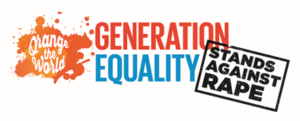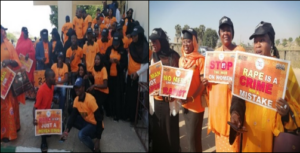Supporting a Future without Violence in Bauchi State – Policy Activism Around the 2019 16 Days of Activism Against Gender-Based Violence Campaign
By Helen John, Gender, Social Inclusion, and Community Engagement Advisor, IHP Bauchi State, Nigeria

Rape is universally considered to be having or performing sexual acts with a person who – is forced, does not want to, feels threated, or is unable to consent. Rape applies to the sex organs but also includes non-consensual oral and anal violations. Like in many other developing countries, rape is endemic in Nigeria. UNICEF reported in 2015 that one in four (1:4) girls and one in 10 (1:10) boys under age 18 in Nigeria had experienced sexual violence. In Nigeria, rape victims usually lack the courage to speak out or report their experiences to the law enforcement agencies due to negative societal attitude. According to the 2018 Nigeria DHS, 32% of women who have ever experienced physical or sexual violence have sought help to stop the violence, while 55% have never sought help or told anyone about the violence.
Recognizing the danger posed by rape to individuals and the society as a whole, Nigerian laws criminalize rape to some degree.
Rape is defined under section 357 of the Criminal Code which applies to the Southern part of Nigeria as: Any person who has unlawful carnal knowledge of a woman or girl, without her consent or with her consent, if the consent is obtained by force or by means of threats or intimidation of any kind, or by fear of harm, or by means of false and fraudulent representation as to the nature of the act, or in the case of a married woman, by personating her husband is guilty of an offence which is called rape.
In Northern Nigeria, it is defined under section 282 of the Penal Code as:
(1) A man is said to commit rape who … has sexual intercourse with a woman in any of the following circumstances:- (a) against her will; (b) without her consent; (c) with her consent, when her consent has been obtained by putting her in fear of death or of hurt; (d) with her consent, when the man knows that he is not her husband and that her consent is given because she believes that he is the man to whom she is or believes herself to be lawfully married; (e) with or without her consent when she is under fourteen years of age or of unsound mind.
(2) Sexual intercourse by a man with his own wife is not rape, if she has attained to puberty.
The two legal examples demonstrate that in Nigeria, rape can only be committed by a man against a woman and not vice versa. In our modern time, this must be updated because it has been recognized that a man may also be a victim of rape perpetrated by any person, including a woman.
Rape with its negative consequence on health and other areas such as femicide, suicide, AIDS-related mortality, and maternal mortality must be stopped at all costs. The question becomes, how can the rising rate of rape cases be stemmed in Nigeria and in Bauchi State?
Recognizing the damaging effect of rape, the Violence Against Persons Prohibition (VAPP) Act was passed into law by the Nigerian Senate at the National level in May 2015. The Act was a result of the need for protection of persons against the different forms of violence both on the home front and in larger society.
Prior to this Act, only women could be ‘raped’ according to the legal definition.[a] However, the VAPP Act acknowledges that men may also be victims of rape and is the first piece of legislation in Nigeria of this kind.

Photo Credit: Amina Garuba
In my opinion, the VAPP Act is revolutionary and this is exactly the kind of instrument that is needed to end the menace of rape which has become a living monster not only in Nigeria but globally. The VAPP Act will help those who have suffered violence in silence without recourse to access rehabilitative, psychological, and/or social services for their recovery and reintegration, ensures that violators are brought to justice, and helps victims receive protection, support, and compensation.
With the National law paving the way, there is need for other States in Nigeria, like Bauchi, to domesticate this Act and employ a multi-dimensional approach to address gender-based violence and rape. Above all, however, there must be awareness and proactive steps taken to fight against rape, while an enabling policy and reporting environment must also be created to ensure that rape victims and survivors can feel comfortable coming forward. Through my work on the USAID-funded Integrated Health Program (IHP) – like a recent Stakeholders Sensitization Meeting on the VAPP Act and rally at the State House – we are supporting efforts to make this happen and create safer communities across Bauchi and Nigeria!
The USAID Integrated Health Program (IHP), led by Palladium, currently provides technical assistance to three States in Nigeria – Kebbi, Bauchi, and Sokoto – to strengthen health systems and improve access to and quality of RMNCH+NM and primary health care services. Expert gender integration and social inclusion partner, WI-HER, LLC, leads efforts that promote equitable services that reach the most marginalized populations while working to advance IHP goals and objectives.
[a] In the definition of rape in other criminal statutes, reference is made to vaginal penetration and because of anatomy, only women could legally be considered victims of rape.